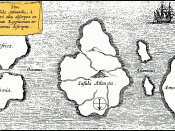Atlantis: The Lost Civilization
Atlantis was a city of great wealth, beauty, and economy. But was it really a city? Did it ever exist, or was it just another great Greek myth? Some researchers believe that Atlantis was similar to the Garden of Eden - a marvelous and magnificent place, until corruption consumed it. Others, the "nay" sayers, believe that it was merely a philosophical device created by Plato to teach the people of Greece a valuable lesson. Because of the fact that the need for credible evidence surpasses people's faith, Atlantis, if there really was an Atlantis, may never be found.
The source of Atlantis's story came from Plato, a Greek philosopher who lived from circa 427 to 347 BC. He was known as the "father of Western thought" (Green 92), and most scholars credit the idea of Atlantis to the Greek philosopher (Williams 20). The only extant references (Green 92) to this fabled civilization are two Socratic dialogues recorded by Plato (Williams 20): "Timaeus" and "Critias."
George Constable and his coeditors state that "Timaeus" and "Critias," which were written circa 355 BC, were "sequels" to "The Republic," a dialogue in which Socrates and his followers worked out their ideal philosophy of government (15). This text may be connected with the parts of the two dialogues that have to do with Atlantis's model government.
According to Adam Green and Jason Grate, et al., in "Timaeus" and "Critias," Plato, through the character of Critias -- Plato's cousin, describes a vast island paradise rich in metals and dotted with luxurious gardens that existed somewhere off the coast of the Straits of Gibraltar. Poseidon, the God of the sea protected this city, which had conquered the surrounding regions with its mighty navy. However, when the island's inhabitants became corrupt and began...


